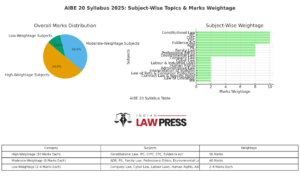Discover the complete AIBE 20 Syllabus 2025 with subject-wise topics, marks weightage, and preparation tips. Stay exam-ready with our student-friendly guide to qualifying AIBE 2025.
Introduction
The All India Bar Examination (AIBE 20) 2025 is a qualifying exam conducted by the Bar Council of India (BCI) for law graduates who wish to practice as advocates in India. To prepare effectively, every candidate must have a clear understanding of the AIBE 20 syllabus, subject-wise topics, and weightage. This not only helps in streamlining preparation but also ensures that students focus more on high-weightage areas to maximize their performance.
In this blog, we’ll provide a detailed breakdown of the AIBE 20 Syllabus 2025, covering subject-wise topics, marks distribution, and preparation tips for aspiring advocates.
AIBE 20 Syllabus 2025 Overview
The AIBE exam is designed to test a candidate’s knowledge of law, legal principles, and application in real-life practice.
- Mode of Exam: Offline (Pen & Paper)
- Type of Questions: Objective (MCQs)
- Total Questions: 100
- Maximum Marks: 100
- Duration: 3 Hours 30 Minutes
- Negative Marking: None
The syllabus is divided into 20 subjects, broadly categorized into core subjects (high weightage) and other subjects (moderate to low weightage).
AIBE 20 Subject-Wise Syllabus & Weightage

High-Weightage Subjects (10 Marks Each)
These subjects carry the most importance and should be given maximum attention.
- Constitutional Law – Fundamental rights, directive principles, separation of powers, emergency provisions.
- Criminal Procedure Code (CrPC) – Arrest, bail, trial procedures, appeals, revision.
- Civil Procedure Code (CPC) – Jurisdiction, suits, res judicata, appeals, execution of decrees.
- Indian Penal Code (IPC) – General principles, offences against human body, property, defamation.
- Evidence Act – Relevancy of facts, admission, confession, burden of proof.
Weightage: 50 Marks (5 subjects × 10 marks each)
2. Moderate-Weightage Subjects (8 Marks Each)
These subjects are equally important and must not be ignored.
- Alternative Dispute Redressal (ADR) – Arbitration, conciliation, mediation.
- Public Interest Litigation (PIL) – Locus standi, scope, judicial activism.
- Family Law – Marriage, divorce, maintenance, inheritance, guardianship.
- Professional Ethics & Cases of Professional Misconduct – Advocates Act, Bar Council rules, landmark judgments.
- Environmental Law – Key legislations, sustainable development, landmark cases.
Weightage: 40 Marks (5 subjects × 8 marks each)
3. Low-Weightage Subjects (2–4 Marks Each)
These subjects carry lesser weight but are easy to score with quick revisions.
- Company Law – Incorporation, directors, shareholders, winding up.
- Cyber Law – IT Act provisions, cybercrimes, data protection.
- Labour & Industrial Laws – Factories Act, Trade Unions Act, Payment of Wages Act.
- Human Rights Law – Constitutional safeguards, international conventions.
- Administrative Law – Delegated legislation, judicial review, principles of natural justice.
- Interpretation of Statutes – Rules of interpretation, internal & external aids.
- Law of Torts including Consumer Protection Laws – Negligence, nuisance, consumer rights.
- Law of Contract, including Specific Relief, Special Contracts – Offer, acceptance, consideration, breach of contract.
- Law of Limitation – Limitation periods for suits, appeals, applications.
- Intellectual Property Law (IPR) – Patents, copyrights, trademarks.
Weightage: 2–4 Marks per subject
AIBE 20 Preparation Tips for Students
- Prioritize High-Weightage Subjects – Focus first on Constitution, IPC, CPC, CrPC, and Evidence Act.
- Revise Moderate Subjects Regularly – Ethics, Family Law, ADR, PIL, and Environmental Law form the backbone of practice.
- Use Bare Acts Extensively – The exam is open-book in nature, so familiarity with bare acts is crucial.
- Practice Previous Year Papers – Solving past AIBE papers helps in understanding the question pattern.
- Time Management – Practice completing 100 questions within 3 hours to build exam stamina.
Conclusion
The AIBE 20 Syllabus 2025 is comprehensive, covering almost every branch of law studied during an LLB course. Smart preparation with a focus on subject-wise weightage can make the difference between qualifying and falling short. By prioritizing high-weightage core subjects, revising moderate subjects thoroughly, and brushing up on low-weightage topics, candidates can secure success in the AIBE 20 exam with confidence.
AIBE 20 Registration 2025: Dates, Eligibility, Exam Details How to Apply






